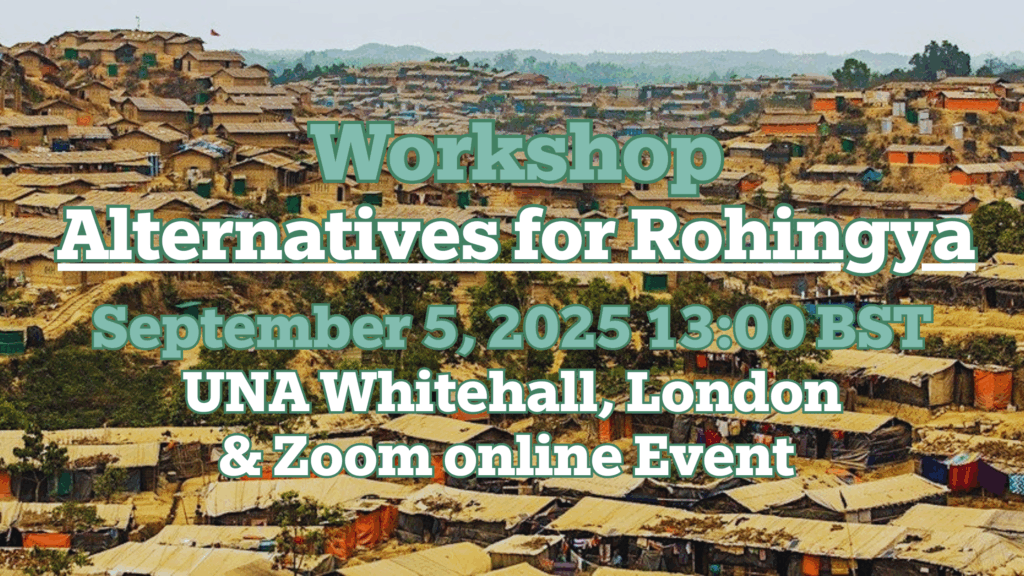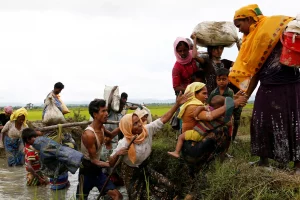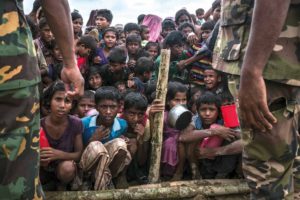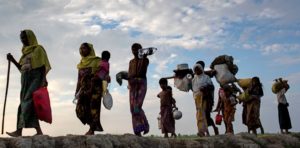Friday 5 September 2025 | 13:00 – 17:00 BST (14:00 – 18:00 CET)
UNA-UK, 3 Whitehall Court, London, SW1A 2EL | Online via Zoom

On 5 September, London will host a timely debate on one of the world’s most protracted and neglected refugee crises. Organised by United Against Inhumanity (UAI), in collaboration with the United Nations Association – UK (UNA-UK) and the University College London Diplomacy Society, the half-day hybrid workshop will bring together experts, members of the Rohingya diaspora, academics and advocates to consider alternatives to a model that is no longer working: humanitarian relief while waiting for repatriation that never comes.
A crisis at breaking point
The Rohingya, a Muslim minority denied citizenship in Myanmar, have endured systematic persecution and repeated expulsions for more than six decades. The largest exodus occurred in 2017, when around 700,000 people fled a genocidal assault by the Myanmar army to camps in Bangladesh.
Since then, international efforts have focused on two tracks: sustaining a vast aid operation and promoting large-scale repatriation. Neither has proved sustainable. The 2021 military coup plunged Myanmar into deeper conflict, with large areas of Rakhine State – the Rohingya homeland – now under the control of the Arakan Army, itself accused of abuses against the Rohingya. Humanitarian access is blocked, and some 300,000 people remain displaced within Myanmar.
Meanwhile, conditions in Bangladesh’s camps are deteriorating rapidly. Years of funding cuts have slashed food rations, leaving families on the brink of malnutrition. As The New Humanitarian recently reported, the model of indefinite camp-based assistance is simply unsustainable.
For those outside Bangladesh – in India, Malaysia, Indonesia or Thailand – life is equally precarious. Most have no legal status, survive on insecure jobs in the informal sector, and face detention or deportation. Many risk perilous sea crossings, only to be stranded offshore when states refuse them entry.
A political opportunity
The London workshop takes place just weeks before the UN High-Level Conference on Rohingya Muslims and other minorities in Myanmar, due to be held in New York on 30 September. Mandated by the UN General Assembly in late 2024, the conference aims to revisit international policy on the crisis.
With a new interim government in Bangladesh and a worsening humanitarian situation, momentum is building for a rethink. Among the issues on the table are:
- Improving security and living conditions in the camps.
- Lifting restrictions on education, livelihoods and freedom of movement.
- Replacing some food aid with cash assistance.
- Investing in development projects to benefit both refugees and host communities.
- Shifting responsibility from international agencies to local and governmental actors.
- Exploring cross-border humanitarian operations between Bangladesh and Myanmar.
- Protecting Rohingya refugees across Asia, not just in Bangladesh.
These proposals are ambitious, and face major political and financial obstacles. But as UAI has argued, the current approach is no longer viable. Without change, conditions will continue to worsen, driving more refugees into desperate journeys or unsafe returns.
Speakers and sessions
The workshop will feature leading voices in humanitarian policy and Rohingya advocacy, including:
- Ian Martin, Chair of UNA-UK and former UN Special Representative
- Laetitia van den Assum, former Dutch Ambassador, member of the Advisory Commission on Rakhine State (2016–17)
- Tun Khin, President of the Burmese Rohingya Organisation UK
- Dr Jeff Crisp, former UNHCR official and UAI volunteer
- Mark Bowden, former UN Assistant Secretary-General
- Shafiur Rahman, filmmaker and Rohingya rights advocate
- Martin Smith – Independent analyst, researcher and journalist who has been writing on Myanmar since the 1980s
- Dr Sultana Khanum – Public health and humanitarian expert
- Lucky Karim, advocate with Refugees International and founder of Refugee Women for Peace and Justice
How to take part
- In person: register by emailing . Places are limited and pre-registration is essential.
- Online: register via Eventbrite. A Zoom link will be sent to all registered participants.
We very much hope you will join us — in London or online — for this important workshop, a forum to explore how the international community can move from managing a crisis to building a sustainable, humane and realistic strategy for Rohingya refugees.











